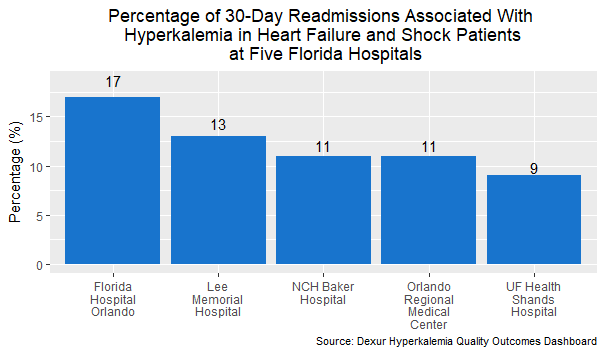Veltassa Could Show Potential in Heart Failure Patients Readmitted with Hyperkalemia
In Veltassa, Hyperkalemia
Get Dexur’s Personalized Hospital Specific Presentation on Quality, Safety, Compliance & Education
By: James Pitt Apr. 18, 2018
Veltassa (patiromer) is a medication introduced in 2015 that binds potassium in the GI tract in order to lower high blood potassium levels, a condition known as hyperkalemia. Hyperkalemia is often comorbid with chronic conditions, including cardiovascular disease. One reason for this comorbidity may be the use of renin-angiotensin-aldosterone system (RAAS) inhibitors, which are very common in heart failure treatments.
Researchers Dr. Murray Epstein of the University of Miami and Dr. Bertram Pitt of the University of Michigan argue that RAAS inhibitors are used less in practice than official guidelines recommend, due to fear of patients developing hyperkalemia. Two randomized controlled trials, OPAL-HK and AMETHYST-DN, found that patients on Veltassa were able to maintain RAAS inhibitor therapy at a higher rate than patients on placebo. A cost-utility analysis published in Value In Health Journal found that adding Veltassa to RAAS inhibitor regimes would be cost-effective, saving both money and quality-adjusted life years.
A Dexur analysis examined the percentage of readmissions attributable to hyperkalemia among cardiovascular patients for five large hospitals in Florida in 2016. Among patients who were discharged with an index heart failure DRG (DRGs 291, 292, and 293) at these hospitals, between 9% and 17% of readmitted patients had hyperkalemia. Dexur’s hyperkalemia quality outcomes data shows that hyperkalemia is a significant factor in readmissions of heart failure patients and Veltassa could play a role in impacting these readmissions.

DEXUR PRO MEMBERS GET ACCESS TO:
- 2016 all-cause and hyperkalemia-related discharges and readmissions for heart failure and shock patients at Florida Hospital Orlando, Lee Memorial Hospital, NCH Baker Hospital, Orlando Regional Medical Center, and UF Health Shands Hospitals.
- State and national 30-day hyperkalemia readmissions rates for heart failure and shock patients.
ABOUT THE AUTHOR
